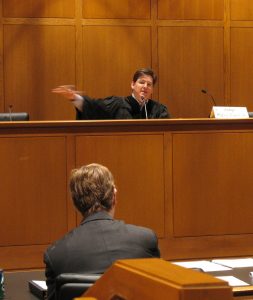____________
This article was written by Brian Vukadinovich, an experienced pro se litigant and the author of Motion for Justice: I Rest My Case.
____________
Judges are behaving badly when it comes to our Sixth Amendment right to represent ourselves. In most cases where a judge mistreats a pro se litigant, it is usually because the judge is biased against pro se litigants in general. And that means they’re biased against the Constitution.
For example, recently a Florida state court judge, Karen Cole, went so far as to publicly state to a group of new young lawyers at an event in Jacksonville, Florida that pro se litigants are “unbalanced”. It is unfortunate that judicial administrators in Florida didn’t sanction this judge. The judge’s inappropriate and discriminatory public comment violated several canons of Florida’s Code of Judicial Conduct.
But this is not surprising. Judicial administrators routinely look the other way when judges abuse lawyers, and they certainly don’t have much interest in sanctioning judges who abuse self-represented litigants. The record speaks for itself.
But we now have a documented case where a state court judge failed to understand the law with respect to a pro se litigant’s Sixth Amendment right to represent himself. In fact the state court of appeals harshly admonished her for this failure. It happened in this particular instance in a criminal case, instead of a civil case where most of the horror stories against pro se litigants occur.
The Indiana Court of Appeals rebuked Lake Superior Court judge Diane Boswell for not knowing that a criminal defendant almost always has the right to proceed to trial without an attorney. According to appellate court records, when the defendant tried to fire his public defender, Judge Boswell said he did not have a right to represent himself. This clueless judge refused to allow the defendant to fire his attorney, asking at one point where he’d heard he had the right to represent himself. Violation of the Sixth Amendment much…
Public Defender: … Judge, first thing, Mr. Wilson has asked and has actually filed with the Court, to strike the appearance of the Lake County Public Defender’s Office altogether from this case. His friends have retained a firm down in Indianapolis that will not enter their appearance until our appearance is struck, so I’m asking.
The Court: That’s denied. He’s set for trial.
Public Defender: I …
The Defendant: I’m ready for trial.
The Court: Pardon?
The Defendant: I’m ready for trial, ma’am.
The Court: Okay. Then we’ll go to trial. If I … if I let you have substitute counsel at this point …
The Defendant: Well, can I file for pro se then. I’ll do it myself. I’ll represent myself.
The Court: No, no, you can’t do that.
The Defendant: It’s my right; right?
The Court: It’s my decision. No, you don’t have a right to represent yourself.
The Defendant: Well, I will not have him represent me then.
The Court: You don’t have a right to represent yourself.
The Defendant: I won’t have him represent me. I’m ready for trial.
The Court: You don’t – you don’t want [the public defender] to represent you?
The Defendant: No, I’m ready for trial.
The Court: Why is that?
The Defendant: I just don’t feel that he can give me reasonable representation during the trial. . . .
The Court: Okay. All right. I can not require you to go forward with [the public defender], but I can require you to go forward on August 18th.
The Defendant: I’m ready.
The Court: So if you’re … well, you may be ready, but you need to advise your people in Indianapolis that they got a trial set on August 18th.
The Defendant: And if they’re not here, I’ll represent myself.
The Court: No, I’ve already decided you can’t represent yourself.
The Defendant: I’m sorry, ma’am. That’s why I’m … I’m going for it. I’m sorry, I mean, I have that right. I know I have that right.
The Court: No, you don’t have that right to represent yourself.
The Defendant: Yes, I do, ma’am.
The Court: You do not. Where did somebody tell you that? What right did you read? Where did you read that?
The Defendant: I have a right to represent myself; I know this.
The Court: You don’t have that – see, that’s why you can’t represent yourself, because you don’t know what rights you have.
You don’t know whether to laugh or cry. The defendant in this case apparently had a better understanding of his Constitutional rights than the judge did. She sentenced him to 100 years in prison for a brutal sexual assault, but he may now be freed on appeal due to her ignorance of the law.
After reviewing the pre-trial hearing transcripts, the appeals court found that the judge appeared “altogether uninformed” about a defendant’s Sixth Amendment right to self-representation. The appellate panel went on to say, “This egregious lack of knowledge presents a serious risk to the rights of defendants.” No kidding!
Most cases of judicial abuse against pro se’s slip right on by; luckily, this one didn’t. But make no mistake, there are plenty more out there. It is unfortunate that we have so many judges on the bench who are ignorant of the laws regarding our rights to self-representation. It is a widespread problem. It’s almost as if the judiciary were at war against the Sixth Amendment.
We as a pro se nation must be vigilant and stand up for our rights. We must demand to be treated fairly when we choose to — or are forced to — represent ourselves in court. Don’t let biased judges stop you from advocating your case yourself. It’s possible you know more about the law than they do.





I represented myself and the commonwealth attorney tried to brutally attack me in court.
I was responding to her and as it seems the judge was being persuaded that I spoke out and he pushed me into a holding cell from the security guards .
I didn’t yell I just spoke out as she was lashing out crazily .she sounded like a guilty house wife rambling hatter Jargin.